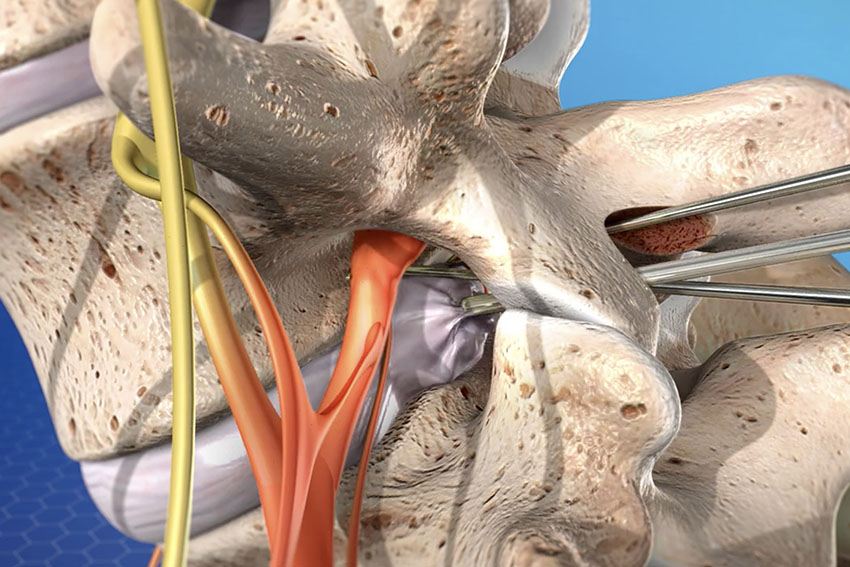Endoscopic Cervical Discectomy is an outpatient surgical procedure in New Jersey that aims to get rid of herniated disc material. Unlike open cervical disc surgery, the procedure does not damage the neck muscles. There’s no need to perform bone removal or large skin incisions, avoiding the risk of a spinal fusion and its long-term side effects to the patient.

Candidates for the Procedure
Executive Spine Surgery performs Endoscopic Cervical Discectomy surgery, a procedure for individuals with disc problems accompanied by the following:
- Severe arm and neck pain, with or without tingling, numbness, or weakness
- Pain that does not respond well with conservative treatments, such as physical therapy, chiropractic, analgesics, muscle relaxants, or cervical traction
- Multiple cervical disc protrusions
- Herniated cervical discs (extruded, free fragments, protruded, ruptured, and prolapsed) as confirmed by radiologic studies
- Small bone spurs linked to a disc protrusion
On the other hand, patients should not undergo endoscopic cervical spine surgery if they experience either of the following:
- Arm, hand, or neck pain not triggered by a herniated disc
- Severe spinal stenosis, characterized by the accumulation of bone in the spinal canal
Our Treatment Approach
If you need to go through endoscopic discectomy treatment in NJ, turn to Executive Spine Surgery. We use advanced minimally invasive tools and techniques to perform the procedure. During the actual surgery, our skilled surgeons will perform the following steps:
- Make a tiny incision in the neck using minimally invasive surgical tools
- Insert an endoscope (a high-definition, pen-sized video camera) through the incision to carefully navigate the cervical spine
- Use the endoscope to take away the bulging, painful (herniated) portion of the disc
On top of our advanced methods and tools, you can rely on Dr. Carl Spivak, Executive Spine Surgery’s board-certified Neurosurgeon who specializes in minimally invasive spine surgery. Having returned to Germany with the latest technology and techniques, Dr. Spivak is committed to keeping up with the most recent innovations in disk regeneration and spine repair. You can be sure that you’re in good hands with Dr. Spivak.
Contact us today to book an appointment.
About Endoscopic Discectomy
Dr. Carl Spivak, board-certified Neurosurgeon and specialist in minimally invasive spine surgery, has returned from Germany with the latest techniques and technology. Dr. Spivak dedicates himself to keeping up with the latest innovations in spine repair and disk regeneration.
Back and neck pain is often caused by the herniation of spinal disks. Traditional methods to repair damaged disks involve a large incision and retraction of the muscle around the spine so that the disk can be removed and replaced or fused. When performed on the neck, there is even more potential for damage, as the voice box and the esophagus must be retracted as well. This can cause unpleasant side effects such as difficulty swallowing and a hoarse voice, as well as scarring. In the case of disk fusion, rather than replacement, there is potential need for future neck surgery, as the remaining disks must compensate for the missing disk and may eventually become damaged by the strain.
To avoid these and other complications, much research has been done in the realm of endoscopic and other minimally invasive techniques. Endoscopic spine surgery is a becoming a popular alternative to more invasive procedures. The pen-size endoscope is a high-definition camera that is inserted with x-ray guidance. The endoscope allows the surgeon to remove the herniated section of the disk with tiny instruments. This relieves pain and suffering with minimal tissue damage and a same day discharge.
Endoscopic spine surgery has become a popular alternative to traditional spine surgery. The endoscope is a pen-sized, high-definition video camera that is inserted into the spine under x-ray guidance. The endoscope allows the surgeon to find and remove the herniated portion of the disk under direct visualization with very tiny instruments, relieving pain and suffering. Advantages of endoscopic surgery include a tiny skin incision, minimal tissue damage and pain, quicker recovery and same-day discharge.
